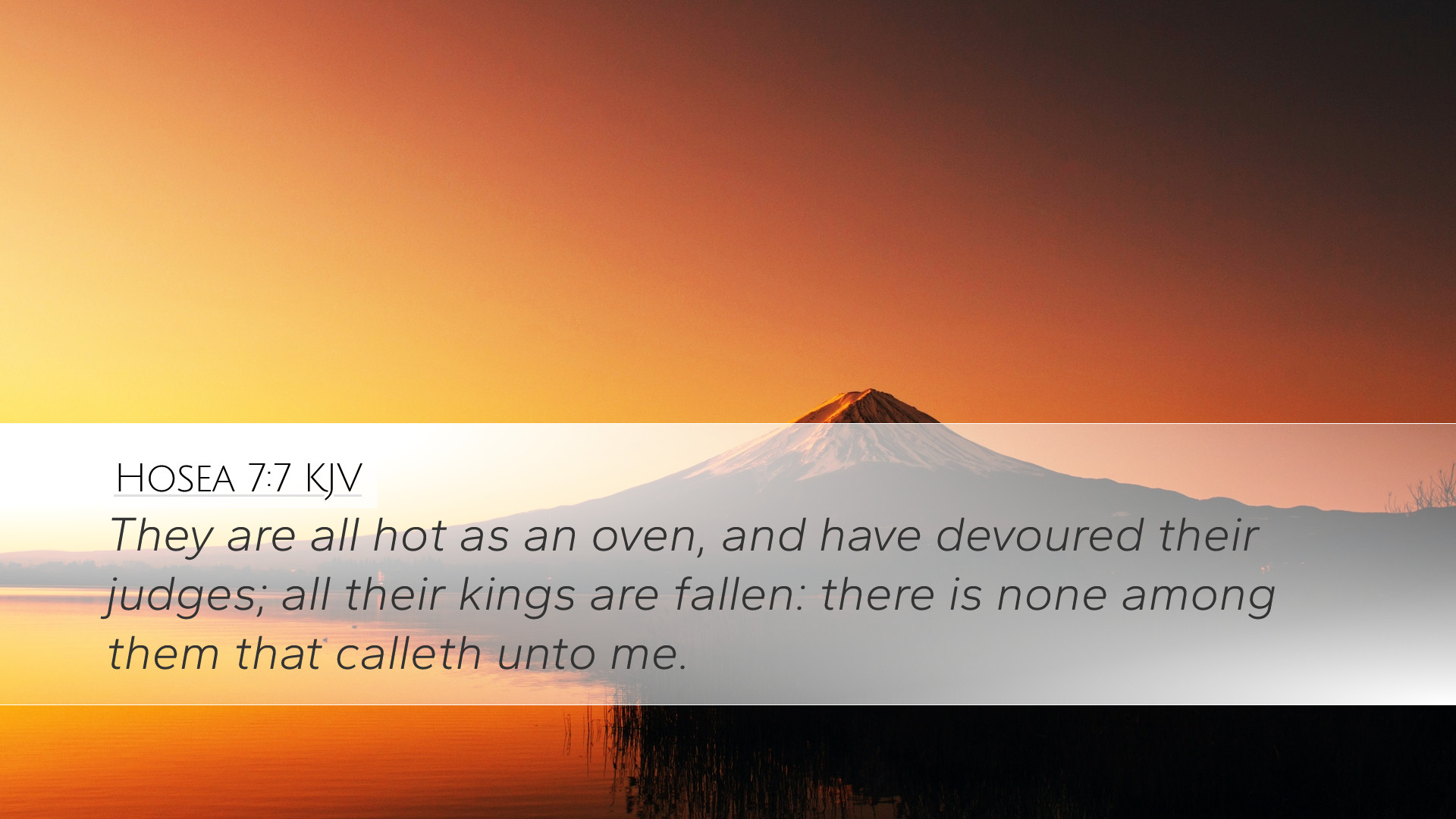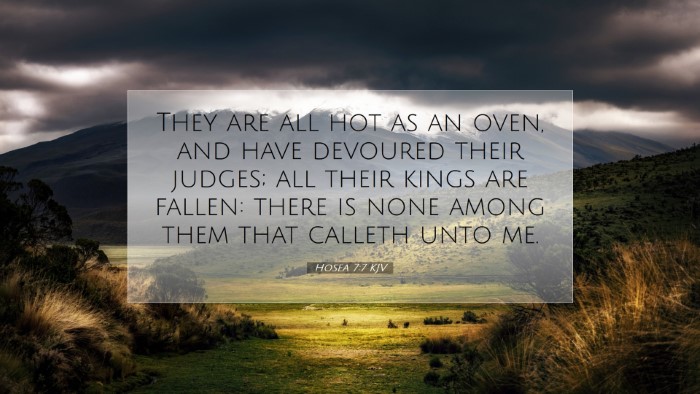Old Testament
Genesis Exodus Leviticus Numbers Deuteronomy Joshua Judges Ruth 1 Samuel 2 Samuel 1 Kings 2 Kings 1 Chronicles 2 Chronicles Ezra Nehemiah Esther Job Psalms Proverbs Ecclesiastes Song of Solomon Isaiah Jeremiah Lamentations Ezekiel Daniel Hosea Joel Amos Obadiah Jonah Micah Nahum Habakkuk Zephaniah Haggai Zechariah MalachiHosea 7:7
Hosea 7:7 KJV
They are all hot as an oven, and have devoured their judges; all their kings are fallen: there is none among them that calleth unto me.
Hosea 7:7 Bible Commentary
Commentary on Hosea 7:7
Verse: "They are all hot as an oven, and have devoured their judges; all their kings are fallen: there is none among them that calleth unto me."
Introduction
The Book of Hosea, a prophetic text belonging to the minor prophets, offers a profound view into the spiritual and moral decline of Israel. Hosea 7:7 serves as a critical reflection of the social and religious apostasy of the people, where a metaphorical heat represents their unrestrained passions and destructive tendencies. This commentary combines insights from various public domain sources to provide a comprehensive examination of the verse.
Historical Context
Hosea prophesied during a tumultuous period in Israel’s history, characterized by political instability, idolatry, and moral decay. The Northern Kingdom of Israel faced constant threats from surrounding nations, while internally, the leadership was marked by corruption and betrayal. This verse succinctly encapsulates the consequences of their actions, demonstrating how their abandonment of God led to chaos.
Exegesis of Hosea 7:7
- “They are all hot as an oven”: The imagery of an oven represents intense desire and uncontrolled passions. Matthew Henry notes that this signifies not only fervent sinfulness but also a collective societal corruption that consumes the very fabric of justice and righteousness.
- “and have devoured their judges”: This phrase indicates the destruction of justice in the land. Albert Barnes explains that the judges, who were supposed to uphold righteousness, fell prey to the people’s sinfulness and greed. Their moral failure illustrates a society in which ungodliness flourishes and the righteous are either corrupted or cast aside.
- “all their kings are fallen”: The downfall of the kings symbolizes the collapse of leadership and authority in Israel. Adam Clarke remarks that this is indicative of God’s judgment upon the nation. The failure of leadership leads to national disaster, as the kings were meant to guide the people toward godliness.
- “there is none among them that calleth unto me”: This stark emptiness shows the desolation of any true spiritual engagement with God. Matthew Henry emphasizes the tragedy that the people have strayed so far from their Creator that no one seeks Him, reflecting a profound abandonment of faith in the face of crises.
Thematic Insights
The themes found in Hosea 7:7 resonate deeply within the theological framework of repentance and divine judgment:
- Human Passion and Sin: The metaphor of the oven warns against the dangers of unchecked desires leading to sin. The intensity of passion can consume the individual and society, leading to destructive outcomes.
- Judicial Corruption: The devouring of judges highlights the intersection of morality and governance. There is a call to uphold justice rooted in divine principles rather than succumbing to the whims of the populace.
- Leadership and Responsibility: The fall of kings is a reminder of the sacred responsibility leaders hold in guiding their people. The failure of leadership results in widespread spiritual decline and societal chaos.
- Spiritual Apathy: The absence of calling upon God underscores the spiritual barrenness that ensues when a society turns away from divine guidance. This apathy can have devastating effects on both individuals and communities.
Applications for Today
This verse serves as an urgent reminder for contemporary believers to reflect on their spiritual state and the health of their communities:
- Self-Examination: Individuals and congregations must regularly assess their relationship with God, being mindful of the quiet creep of spiritual apathy that can lead to a disconnect from divine wisdom and guidance.
- Advocacy for Justice: Followers of Christ are called to be advocates for justice and righteousness. This means standing against corruption and ensuring that leadership—both in the church and the nation—embodies moral integrity.
- Restoration and Repentance: The call to return to God is always open. Churches and individuals are encouraged to reclaim their commitment to prayer and supplication, seeking God’s mercy and restoration for their lives and communities.
Conclusion
Hosea 7:7 paints a stark picture of a community engulfed by sin, characterized by moral decay, failed leadership, and a disconnection from God. The insights from public domain commentaries provide a multifaceted understanding of this passage, urging contemporary readers to heed its warnings. Through a commitment to justice, a focus on righteous leadership, and a revival of sincere spiritual engagement with God, individuals and communities can navigate the complexities of modern life while staying anchored in faith.


